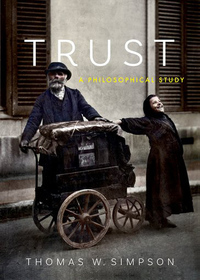
- University of Oxford
- Associate Professor of Philosophy and Public Policy
- Faculty Fellow (2020-2021)
- “Faith, Flag, Family: Sources of Civic Trust”
Thomas Simpson is Associate Professor of Philosophy and Public Policy at the Blavatnik School of Government, University of Oxford, and a Senior Research Fellow, Wadham College. His research focuses on a variety of issues in moral and political philosophy, especially on trust and the nature of freedom. While his past work has focused on trust between individuals—its nature, justification, and value—his current work explores the political implications of trust, especially trust as a vital component for a stable polity and for enabling individuals and communities to flourish. A due appreciation for the significance of trust focuses attention on those institutions that sustain a trusting social ecosystem. These institutions are those promoted by the ‘three F’s’: namely, faith, flag and family.
Professor Simpson is co-editor of The Philosophy of Trust (Oxford University Press, 2017), and is concluding his first monograph, Trust, which is under contract with Oxford University Press (forthcoming in 2021). He has published in leading journals, such as Philosophy and Public Affairs, Australasian Journal of Philosophy, and Philosophical Quarterly, and on a range of topics including political philosophy, applied ethics (including technology and war), social epistemology, and testimony.
Professor Simpson has served as a visiting scholar in the Department of Linguistics and Philosophy at the Massachusetts Institute of Technology (MIT). Between his degrees, he served as an officer with the Royal Marines Commandos, with tours in Northern Ireland, Iraq, and Afghanistan. He is an associate fellow at Policy Exchange, one of the UK’s leading think tanks, where he leads a project on academic freedom.
Publications
-
Trust: A Philosophical Study
Oxford University Press, 2023

Trust and trustworthiness are core social phenomena, at the heart of most everyday interactions. Yet they are also puzzling: while it matters to us that we place trust well, trusting people who will not let us down, both also seem to involve morally driven attitudes and behaviours. Confronted by whether I should trust another, this tension creates very practical dilemmas.
In Trust, Thomas Simpson addresses the foundational question, why should I trust? Philosophical treatments of trust have tended to focus on trying to identify what the attitude of trust consists in. Simpson argues that this approach is misguided, giving rise to merely linguistic debates about how the term 'trust' is used. Instead, he focuses attention on the ways that trust is valuable. The answer defended comprises two claims, which at first seem to be in tension. One is a form of evidentialism about trust: normally, your trust should be based on the evidence you have for someone's trustworthiness. But, second, someone's word is normally enough to settle for you whether you should trust them. Social norms of trustworthiness explain why both are normal.
Methodologically innovative, Trust also applies the account , addressing how cultures of trust can be sustained, and the implications of trust in God. While it is a philosophical essay, the book is written in a way that presumes no prior knowledge of philosophy, to be accessible to the scholars from the many disciplines also attracted and puzzled by trust.